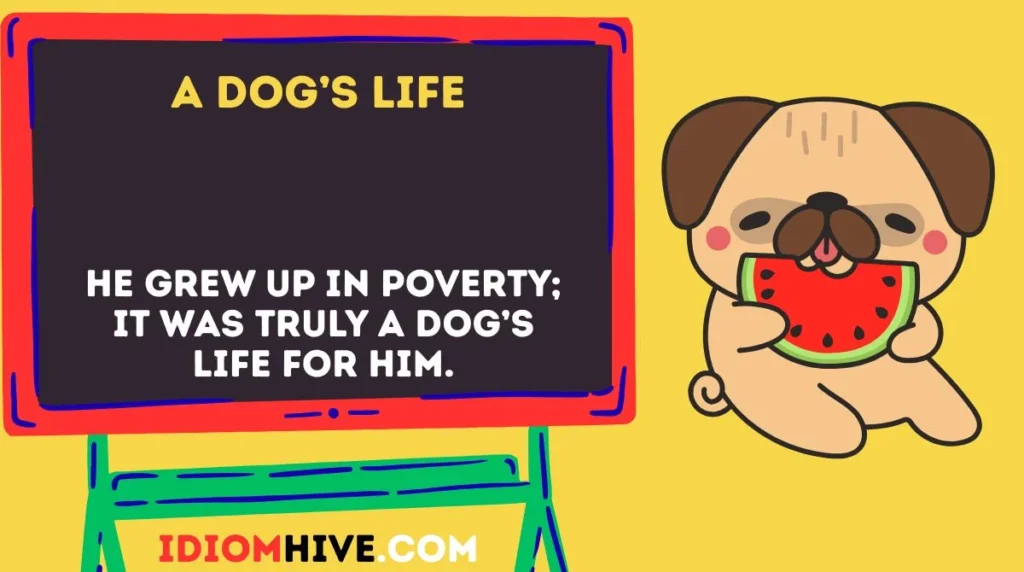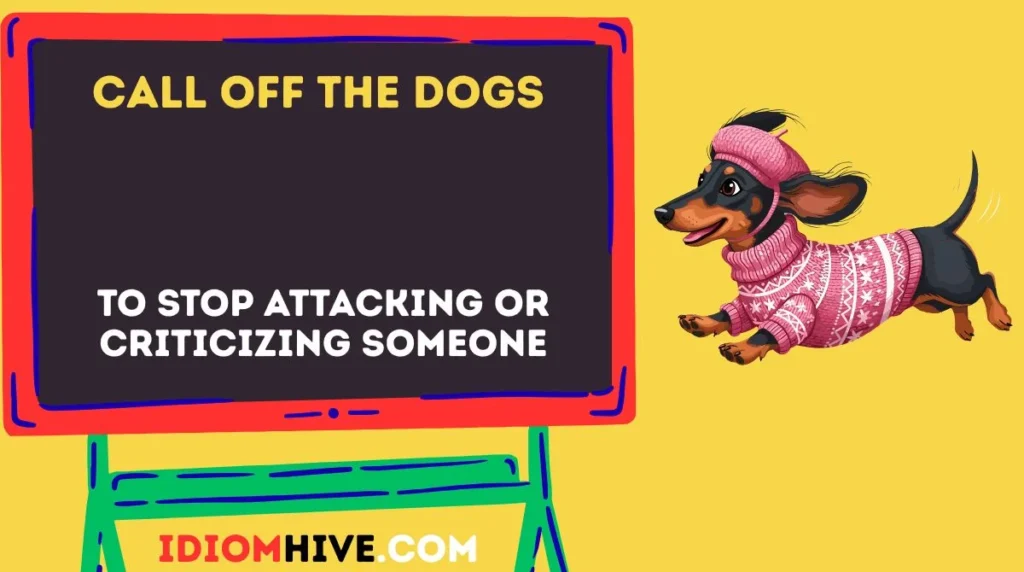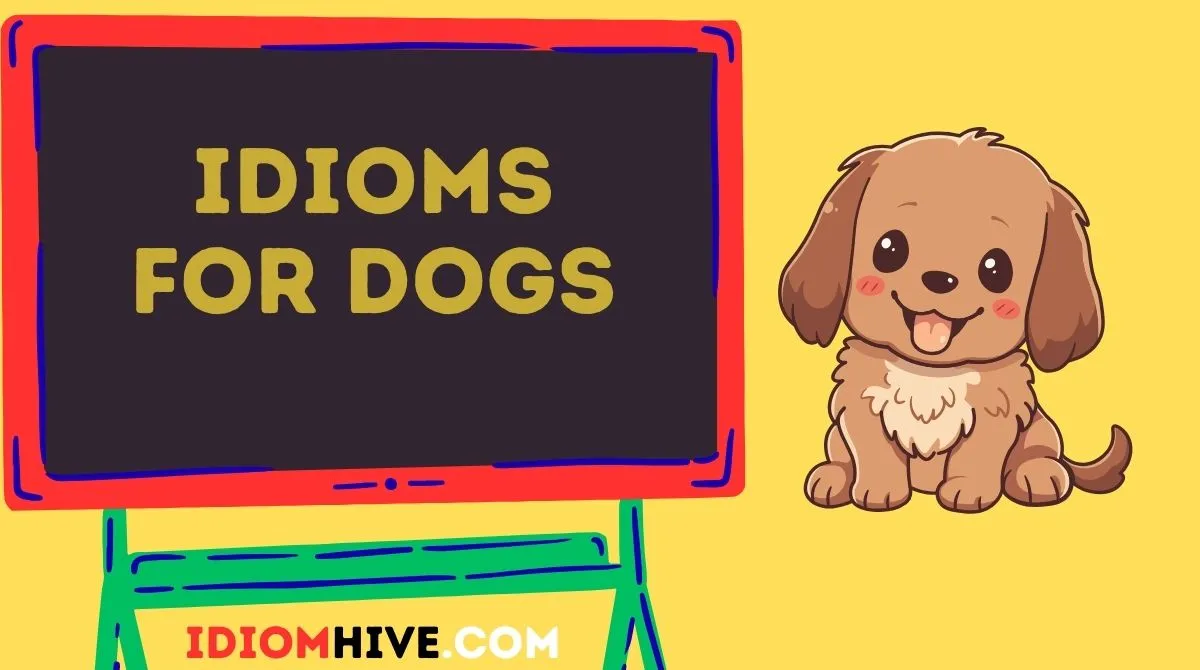Language is full of creative expressions, and one of the most exciting parts of English is idioms. Idioms are phrases that don’t mean exactly what the words say, but instead carry a hidden or figurative meaning.
They make conversations colorful, engaging, and more natural. Among the countless idioms in English, dog-related idioms are some of the most popular and widely used.
Dogs have been human companions for thousands of years. Loyal, playful, and protective, they naturally found their way into our language.
Idioms for dogs help us describe people, emotions, situations, and even behaviors in a fun and memorable way.
Whether you’re a learner of English, a teacher, or simply someone who enjoys wordplay, knowing these idioms will give you a richer vocabulary and a deeper cultural understanding of the English language.
Did You Know?
The phrase “raining cats and dogs” has been around since the 17th century. Some historians believe it came from old European myths where animals like cats and dogs symbolized storms and chaos. Others say it’s because heavy rains used to wash dead animals into the streets, making the saying quite literal in the past!
Dog Idioms About Life and Behavior
A Dog’s Life

Meaning: A hard, unhappy, or difficult life.
Example: He grew up in poverty; it was truly a dog’s life for him.
Similar Idiom: “Life of hardship.”
Note: Often used in informal daily conversations.
Dog Days
Meaning: The hottest days of summer.
Example: We stayed indoors during the dog days of July.
Similar Idiom: “The heat of summer.”
Note: Common in weather-related talks and informal settings.
Top Dog
Meaning: The most important person in a group or situation.
Example: After the promotion, she became the top dog in the office.
Similar Idiom: “Big shot.”
Note: Used in both formal (business) and informal conversations.
Underdog
Meaning: A person who is least likely to win but is still admired.
Example: The underdog team surprised everyone and won the match.
Similar Idiom: “Dark horse.”
Note: Popular in sports, competitions, and motivational contexts.
Dog-Tired
Meaning: Extremely tired.
Example: After working 12 hours, I was dog-tired.
Similar Idiom: “Dead tired.”
Note: Informal; often used in daily conversations.
Let Sleeping Dogs Lie
Meaning: Avoid starting trouble when things are peaceful.
Example: Don’t bring up old arguments—let sleeping dogs lie.
Similar Idiom: “Don’t stir the pot.”
Note: Common in advice-giving, often informal.
Every Dog Has Its Day
Meaning: Everyone gets a chance to succeed at some point.
Example: Don’t worry—you’ll win eventually. Every dog has its day.
Similar Idiom: “Your time will come.”
Note: Used to encourage someone; informal.
Sick as a Dog
Meaning: Very ill.
Example: I was sick as a dog after eating spoiled food.
Similar Idiom: “Down with a bug.”
Note: Informal and common in health-related talks.
Dog Idioms About People and Relationships
Dog-Eat-Dog World
Meaning: A very competitive and ruthless environment.
Example: The corporate world is truly dog-eat-dog.
Similar Idiom: “Cutthroat world.”
Note: Common in business contexts.
Love Me, Love My Dog
Meaning: If you love someone, you must accept everything about them.
Example: She adores him and his messy habits—love me, love my dog.
Similar Idiom: “Take the good with the bad.”
Note: Used in both personal and social situations.
Hair of the Dog
Meaning: Drinking alcohol to cure a hangover.
Example: He had a shot of whiskey as the hair of the dog.
Similar Idiom: None direct, but “morning drink” is similar.
Note: Informal; often humorous.
Like a Dog with a Bone
Meaning: Someone who never gives up.
Example: She was like a dog with a bone, refusing to stop until she solved the puzzle.
Similar Idiom: “Persistent as ever.”
Note: Positive or negative, depending on tone.
Go to the Dogs
Meaning: To decline, get worse, or fall apart.
Example: The company has really gone to the dogs after mismanagement.
Similar Idiom: “Falling apart.”
Note: Informal; critical situations.
His Bark Is Worse Than His Bite
Meaning: Someone seems aggressive but is actually harmless.
Example: Don’t worry about the boss; his bark is worse than his bite.
Similar Idiom: “All talk, no action.”
Note: Informal, often reassuring.
In the Doghouse
Meaning: Being in trouble or out of favor with someone.
Example: He forgot her birthday and now he’s in the doghouse.
Similar Idiom: “On thin ice.”
Note: Common in relationships and friendships.
Dog in the Manger
Meaning: Someone who doesn’t use something but won’t let others use it.
Example: She never reads the books but won’t let anyone borrow them—a real dog in the manger.
Similar Idiom: “Selfish behavior.”
Note: Slightly formal; often critical.
Lucky Dog
Meaning: A fortunate person.
Example: He won the lottery—what a lucky dog!
Similar Idiom: “Fortunate soul.”
Note: Informal, cheerful tone.
Dog Idioms About Situations and Emotions
Barking Up the Wrong Tree
Meaning: Accusing the wrong person or taking the wrong approach.
Example: If you think I broke the vase, you’re barking up the wrong tree.
Similar Idiom: “Pointing the finger at the wrong person.”
Note: Common in daily arguments and problem-solving.
Work Like a Dog
Meaning: Work very hard.
Example: He worked like a dog to finish the project.
Similar Idiom: “Work tirelessly.”
Note: Informal, but also used professionally.
Dogged Determination
Meaning: Strong persistence.
Example: She showed dogged determination to succeed in her studies.
Similar Idiom: “Never-say-die spirit.”
Note: Formal and positive.
Barking Mad
Meaning: Completely crazy.
Example: You must be barking mad to drive in this storm.
Similar Idiom: “Out of your mind.”
Note: British English, informal.
Dog Around
Meaning: To waste time or behave lazily.
Example: He just dogs around all day without doing any work.
Similar Idiom: “Laze about.”
Note: Informal and casual.
Dog-Paddle
Meaning: A simple swimming style with no technique.
Example: The child could only dog-paddle in the pool.
Similar Idiom: “Splash around.”
Note: Informal, daily use.
Throw to the Dogs
Meaning: Abandon someone or something without care.
Example: The company threw its loyal workers to the dogs during the crisis.
Similar Idiom: “Betray someone.”
Note: Slightly formal, negative.
Dog and Pony Show
Meaning: A flashy but meaningless display or event.
Example: The presentation was just a dog and pony show with no real content.
Similar Idiom: “All show, no substance.”
Note: Common in professional or political contexts.
Dog Idioms in Expressions and Sayings
Rain Cats and Dogs
Meaning: Rain very heavily.
Example: It was raining cats and dogs all night long.
Similar Idiom: “Pouring rain.”
Note: Very common in daily English.
Dog’s Breakfast
Meaning: A complete mess.
Example: Your project is a dog’s breakfast—you need to redo it.
Similar Idiom: “Total disaster.”
Note: British English, informal.
Call Off the Dogs

Meaning: To stop attacking or criticizing someone.
Example: The manager finally called off the dogs after the issue was resolved.
Similar Idiom: “Ease up.”
Note: Informal but often used in workplaces.
Tail Wagging the Dog
Meaning: A small part controlling the whole.
Example: The minor issue became the main focus—it’s the tail wagging the dog.
Similar Idiom: “Upside down priorities.”
Note: Common in business or political contexts.
Gone to the Dogs
Meaning: Something that has badly deteriorated.
Example: This neighborhood has gone to the dogs over the years.
Similar Idiom: “Run-down.”
Note: Informal, critical tone.
Dogfight
Meaning: An intense fight or struggle.
Example: The debate turned into a political dogfight.
Similar Idiom: “Heated clash.”
Note: Informal, strong imagery.
Puppy Love
Meaning: Young or immature love.
Example: Their relationship is just puppy love—it won’t last long.
Similar Idiom: “Young crush.”
Note: Informal, light-hearted.
Shaggy-Dog Story
Meaning: A long, pointless story with no real ending.
Example: He bored us with a shaggy-dog story at dinner.
Similar Idiom: “Rambling tale.”
Note: British English, humorous.
How to Use These Idioms in Daily Life
- In Speaking: Use dog idioms to sound natural in casual talks. For example, instead of saying “I’m very tired,” say “I’m dog-tired.”
- In Writing: Dog idioms add creativity to stories, essays, or even professional writing. For example, “The company is a top dog in its industry.”
- In Professional Use: Some idioms like “dog-eat-dog world” or “tail wagging the dog” are perfect for business discussions and presentations.
Common Mistakes Learners Make With Idioms
- Wrong Context:
❌ It was raining dogs and cats.
✔ It was raining cats and dogs. - Mixing Idioms:
❌ He’s the underdog dog-tired man.
✔ He’s the underdog, but he worked dog-tired to succeed. - Literal Understanding:
❌ He worked like a dog—so he must have been lazy.
✔ He worked like a dog—meaning he worked very hard.
FAQs
1. Why are dogs used in so many idioms?
Because dogs have been close companions to humans for centuries, they became natural symbols in language—representing loyalty, laziness, toughness, and emotion.
2. Are dog idioms formal or informal?
Most are informal, but some (like “dogged determination”) are used in formal contexts too.
3. Do British and American English share the same dog idioms?
Many are shared, but some differ. For example, “dog’s breakfast” is more British, while “dog and pony show” is American.
4. Can I use idioms in business English?
Yes, but choose wisely. Idioms like “top dog” or “dog-eat-dog” fit professional contexts, but “sick as a dog” may not.
5. How can I learn idioms more effectively?
Practice them in real conversations, read widely, and create flashcards with meanings and examples.
Conclusion
Dog idioms add fun, depth, and vivid imagery to English conversations. From describing hard work (“work like a dog”) to talking about relationships (“in the doghouse”) or even the weather (“raining cats and dogs”),
these expressions make your language more lively and engaging. Whether you’re writing, speaking, or just trying to understand native speakers better, learning dog idioms will give you an edge.
So next time you’re tired, competitive, or just playful, try out one of these idioms—you’ll sound more natural and fluent in no time!










